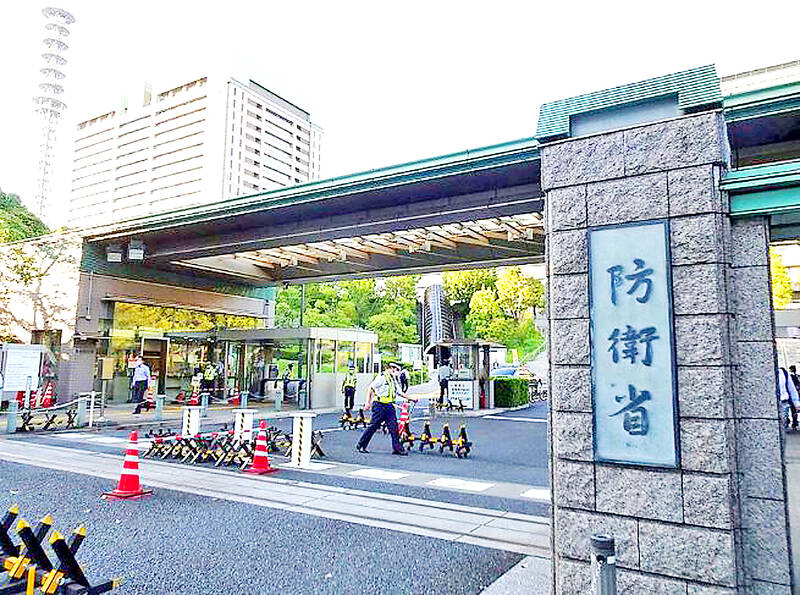Japan has chosen 33 airports and ports as candidates for improvement to enhance military capabilities, with a particular focus on infrastructure that could be utilized in a Taiwan emergency, according to a recent report in Japan’s Nikkei Shimbun.
Citing the Japanese government’s fiscal budget proposal for next year, the newspaper said Toyko is to name some facilities as essential bases and receive funding for upgrades in line with the revamped national security strategy published last year.
According to an unofficial policy document drafted last month and reviewed by the Nikkei, the Japanese government designated 14 airports and 19 ports for improvement, including 16 facilities in the Ryukyu Islands encompassing Okinawa, as well as Kyushu and Shikoku.

Photo: CNA
The selection of the sites suggests a concern with areas near China, a country of surging military capabilities that analysts say could become the focal point of a major conflict in Asia, it said.
New Ishigaki, Miyako and Naha in Okinawa, Kagoshima and Miyazaki in Kyushu, and Kochi in Shikoku are among the airports listed in the government’s plan, the Nikkei said.
These airports could be used as bases for the Japan Self-Defense Forces to deploy troops and supply Taiwan with fuel and food in case of a contingency, the newspaper said.
Yonaguni, New Ishigaki and Miyako airports with their 2,000m-long runways are difficult places to take off or land for heavy military transport aircraft including Japan’s Kawasaki C-2, capable of moving 100 people, it said.
The capability to accommodate heavy cargo planes would enable the evacuation of local residents if necessary, the newspaper said.
Other airports are being considered for runway extensions and installation of a variety of improvements encompassing new parking lots, taxiways and hangars that would allow their utilization by the Japan Self-Defense Forces and Coast Guard, according to the Nikkei.
A civilian runway of 2,500m or more that is easy to use for defense purposes is a security asset for Japan, a senior Japan Self-Defense Force official was quoted as saying.
Japan is eyeing Yonaguni Island for a new port capable of accommodating escort and patrol vessels, while the docks at Ishigaki, Hirara and Naha ports in Okinawa, Kumamoto port and Hakata port in Fukuoka are to be overhauled, Nikkei said.
Facilities in Hokkaido and Fukui prefectures, which respectively have to deal with Russian and North Korean threats, are also to be upgraded, the Nikkei said.
The list of airports and ports to receive improvements is classified and its content is subject to change, it said.
Japan has begun briefing local officials on its plans and ranking members of the government already visited Miyako over the matter of refurbishing Miyako Airport and the Port of Hirara, Nikkei said.

Chinese Nationalist Party (KMT) Chairman Eric Chu (朱立倫), spokeswoman Yang Chih-yu (楊智伃) and Legislator Hsieh Lung-chieh (謝龍介) would be summoned by police for questioning for leading an illegal assembly on Thursday evening last week, Minister of the Interior Liu Shyh-fang (劉世芳) said today. The three KMT officials led an assembly outside the Taipei City Prosecutors’ Office, a restricted area where public assembly is not allowed, protesting the questioning of several KMT staff and searches of KMT headquarters and offices in a recall petition forgery case. Chu, Yang and Hsieh are all suspected of contravening the Assembly and Parade Act (集會遊行法) by holding

PRAISE: Japanese visitor Takashi Kubota said the Taiwanese temple architecture images showcased in the AI Art Gallery were the most impressive displays he saw Taiwan does not have an official pavilion at the World Expo in Osaka, Japan, because of its diplomatic predicament, but the government-backed Tech World pavilion is drawing interest with its unique recreations of works by Taiwanese artists. The pavilion features an artificial intelligence (AI)-based art gallery showcasing works of famous Taiwanese artists from the Japanese colonial period using innovative technologies. Among its main simulated displays are Eastern gouache paintings by Chen Chin (陳進), Lin Yu-shan (林玉山) and Kuo Hsueh-hu (郭雪湖), who were the three young Taiwanese painters selected for the East Asian Painting exhibition in 1927. Gouache is a water-based

Taiwan would welcome the return of Honduras as a diplomatic ally if its next president decides to make such a move, Minister of Foreign Affairs Lin Chia-lung (林佳龍) said yesterday. “Of course, we would welcome Honduras if they want to restore diplomatic ties with Taiwan after their elections,” Lin said at a meeting of the legislature’s Foreign Affairs and National Defense Committee, when asked to comment on statements made by two of the three Honduran presidential candidates during the presidential campaign in the Central American country. Taiwan is paying close attention to the region as a whole in the wake of a

OFF-TARGET: More than 30,000 participants were expected to take part in the Games next month, but only 6,550 foreign and 19,400 Taiwanese athletes have registered Taipei city councilors yesterday blasted the organizers of next month’s World Masters Games over sudden timetable and venue changes, which they said have caused thousands of participants to back out of the international sporting event, among other organizational issues. They also cited visa delays and political interference by China as reasons many foreign athletes are requesting refunds for the event, to be held from May 17 to 30. Jointly organized by the Taipei and New Taipei City governments, the games have been rocked by numerous controversies since preparations began in 2020. Taipei City Councilor Lin Yen-feng (林延鳳) said yesterday that new measures by